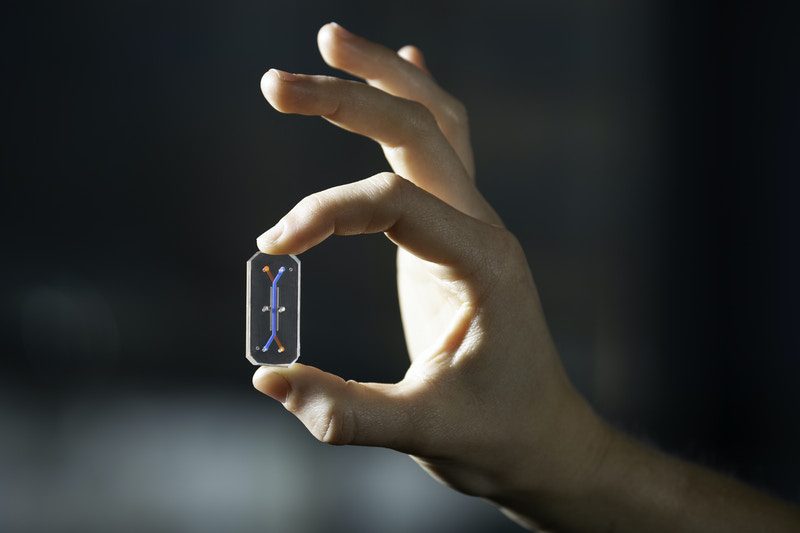The award will fund the development of human Organ Chips with automated in-line sensors to study vaccine responses
The Wyss Institute for Biologically Inspired Engineering has been selected as one of three participants in a new federal ImmuneChip+ Program to develop advanced tissue chip platforms with immune system components and automated monitoring.
As part of the BARDA ImmuneChip+ Program, Wyss Institute researchers will use develop advanced tissue chip platforms with immune system components and automated monitoring. Credit: Wyss Institute at Harvard University
The program is co-sponsored by the Biomedical Advanced Research and Development Authority (BARDA), part of the office of the assistant Secretary for Preparedness and Response at the U.S. Department of Health and Human Services, and the National Center for Advancing Translational Sciences (NCATS).
As part of ImmuneChip+, the Wyss Institute received a contract award from BARDA that funds a one-year research program under the direction of Wyss Founding Director Don Ingber, M.D., Ph.D., focused on developing human lymphoid follicle chip (LF Chip) microfluidic culture devices that replicate immune vaccination responses, with instrumentation for in-line, continuous monitoring.
Vaccination-on-a-chip
Lymphoid follicles (LF) are the smallest functional unit of lymph nodes, and contain aggregations of immune cells including B cells, T cells, and dendritic cells. LFs coordinate the body’s immune response against pathogens and are a key part of the vaccination process, in which a “memory” of a mock invader is created so that an effective immune response can be mounted the next time the pathogen is encountered.
The Wyss Institute team, led by Girija Goyal, Ph.D. working with Ingber, has been able to replicate the vaccination process in vitro in an Organ Chip. Their goal now is to engineer Organ Chip culture systems that can continuously monitor the tissue’s responses to increase understanding of health and disease without putting human test subjects at risk, and enable more efficient assessment of potential treatments.
To achieve this goal with LF Chips, the Wyss team will build a microfluidic sensor cartridge that senses and samples multiple biomarkers in the LF Chip repeatedly over time. They will then integrate it into existing Organ Chip culture systems, develop an automated microfluidic readout instrument using commercial parts, and demonstrate in-line sensing of two or more human vaccine-related biomarkers.
This will be accomplished by leveraging recent work focused on instrumented microfluidic Organ Chip devices made by Adama Sesay, Ph.D., and major advances in electrochemical sensing of biomarkers in small volumes made by Pawan Jolly, Ph.D. as part of the Institute’s Bioinspired Therapeutics and Diagnostics Platform led by Ingber.
In addition to the Wyss Institute’s work, other BARDA awardees will be developing their own instrumentation to collectively create a set of mature ImmuneChips that enable the study of how the body’s reaction to immune threats plays out across multiple organs.
The Wyss Institute team successfully demonstrated this human Body-on-Chips system in the past by linking eight different types of Organ Chips together via a common vascular network.
RELATED:
Organ-on-a-chip maker Emulate eyes expansion with $82M round Boston Business Journal
Emulate Announces Lung-Chip Technology Used by U.S. Army to Study Effects of COVID-19 Emulate
Human organ chips enable COVID-19 drug repurposing Science Daily


